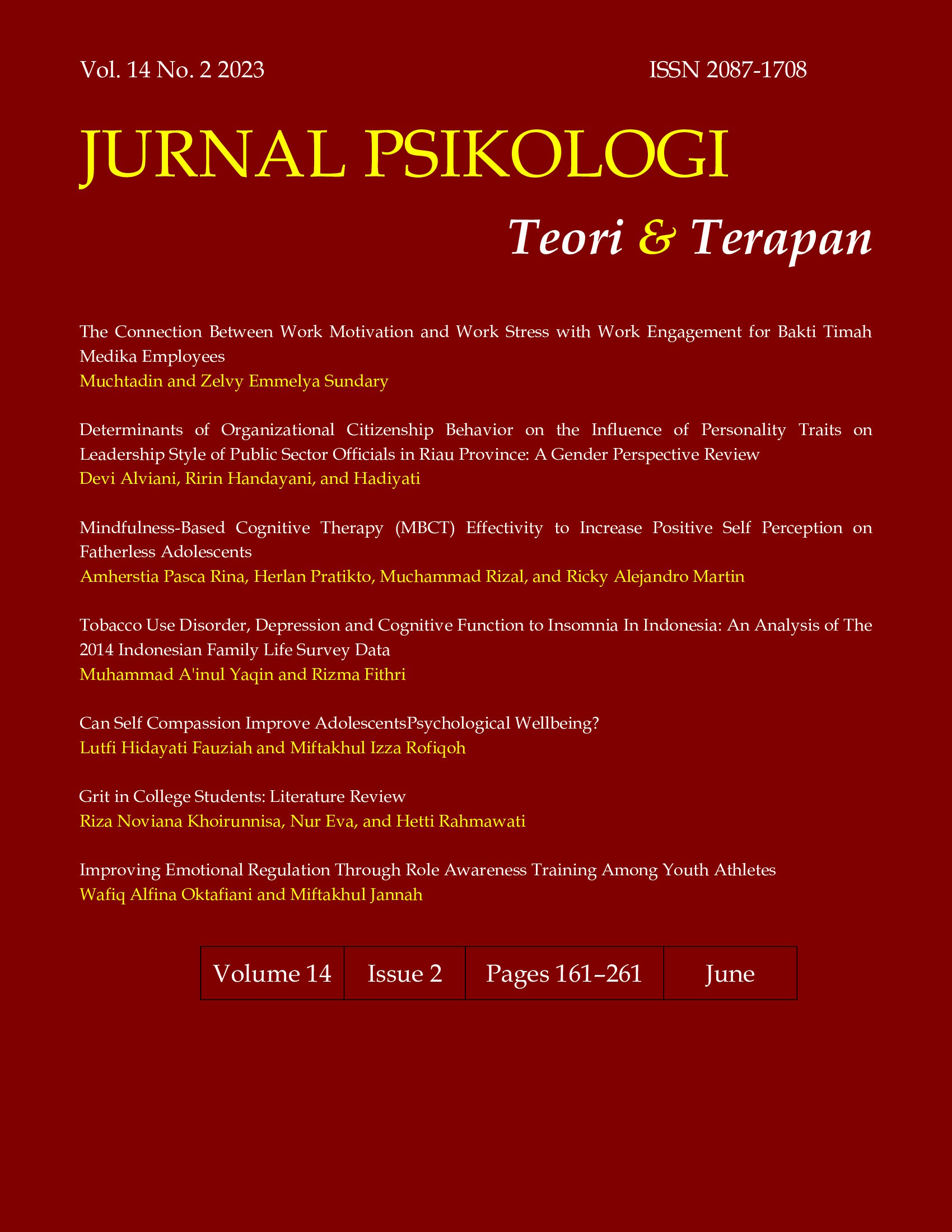Determinants of Organizational Citizenship Behavior on the Influence of Personality Traits on Leadership Style of Public Sector Officials in Riau Province: A Gender Perspective Review
DOI:
https://doi.org/10.26740/jptt.v14n2.p174-192Keywords:
Leadership styles, neuroticism, , openness to experience, gaya kepemimpinan, keterbukaan terhadap pengalaman, neurotisme , perilaku kewargaan organisasiAbstract
This research aimed to find out the determination of organizational citizenship behavior on the relationship between personality traits and leadership styles. The sample in this research is 234 respondents from 1.080 population, filled by the leader of Riau province public sector. Quantitative method used in this research. This research used probability sampling technique, proportional stratified random sampling method, and the Krejcie and Morgan, 1970 formula. The verification analysis technique of this research was carried out with statistical tests of Structural Equation Modeling (SEM) and Analysis of Moment Structure (AMOS) as analysis tools. This research shows that: openness to experience has a positive and significant effect on leadership style; neuroticism has a positive and significant effect on leadership style; organizational citizenship behavior is a quasi-moderating between openness to experience and leadership style positively and significantly; and organizational citizenship behavior is a quasi-moderation on the between neuroticism and leadership style negative and significantly.
Penelitian ini dilaksanakan pada Sektor Publik Provinsi Riau dengan tujuan mengetahui determinan organizational citizenship behavior pada hubungan personality traits dan gaya kepemimpinan pejabat. Kuantiitatif digunakan sebagai pendekatan pada penelitian ini. Pengambilan sampel dilakukan dengan teknik sampling Probability, metode Proportionate Stratified Random Sampling dengan formula Krejcie and Morgan, 1970 dari 1.080 populasi menjadi 234 responden. Teknik analisa verifikatif penelitian ini dilakukan dengan uji statistic Structural Equational Modelling (SEM) dan Analysis of Moment Structure (AMOS) sebagai alat analisisnya. Hasil analisis membuktikan variabel openness to experience berpengaruh positif signifikan terhadap gaya kepemimpinan; variabel neuroticism berpengaruh positif signifikan terhadap gaya kepemimpinan; variabel organizational citizenship behavior merupakan quasi moderasi pada hubungan openness to experience dan gaya kepemimpinan secara positif signifikan; dan variabel organizational citizenship behavior merupakan quasi moderasi pada hubungan neuroticism dan gaya kepemimpinan secara negatif signifikan.
References
Bass, Bernard M., and Ruth Bass. 2009. The Bass Handbook of Leadership: Theory, Research, and Managerial Applications. New York: Free Press.
Carpenter, M., T. Bauer, and B. Erdogan. 2009. Management and Organizational Behavior 1.1. Vol. 1. NJ Prentice-Hall: Scientific Research Publishing.
Friska. 2004. Kepemimpinan Dalam Organisasi. 7th ed. Jakarta: PT. Indeks.
Masunah, Siti, and Yayuk Nurjanah. 2019. Kepemimpinan Dan Manajemen Pendidikan. Tangerang Selatan: Universitas Terbuka.
Downloads
Published
How to Cite
Issue
Section
License

This work is licensed under a Creative Commons Attribution-NonCommercial 4.0 International License.
Authors who publish in this journal agree to the following terms:
Copyright in any article is held by the author.
The author grants the journal, publication rights with the work simultaneously licensed under a Creative Commons Attribution License that allows others to share the work with an acknowledgment of the work's authorship and initial publication in this journal.
Authors may enter into separate, additional contractual arrangements for the non-exclusive distribution of the journal's published version of the work (e.g., posting it to an institutional repository or publishing it in a book), with an acknowledgment of its initial publication in this journal.
Authors are permitted and encouraged to post their work online (e.g., in an institutional repository or on their website) prior to and during the submission process, as this can lead to productive exchanges, as well as earlier and greater citation of published work.
 Abstract views: 683
,
Abstract views: 683
, PDF Downloads: 550
PDF Downloads: 550


















